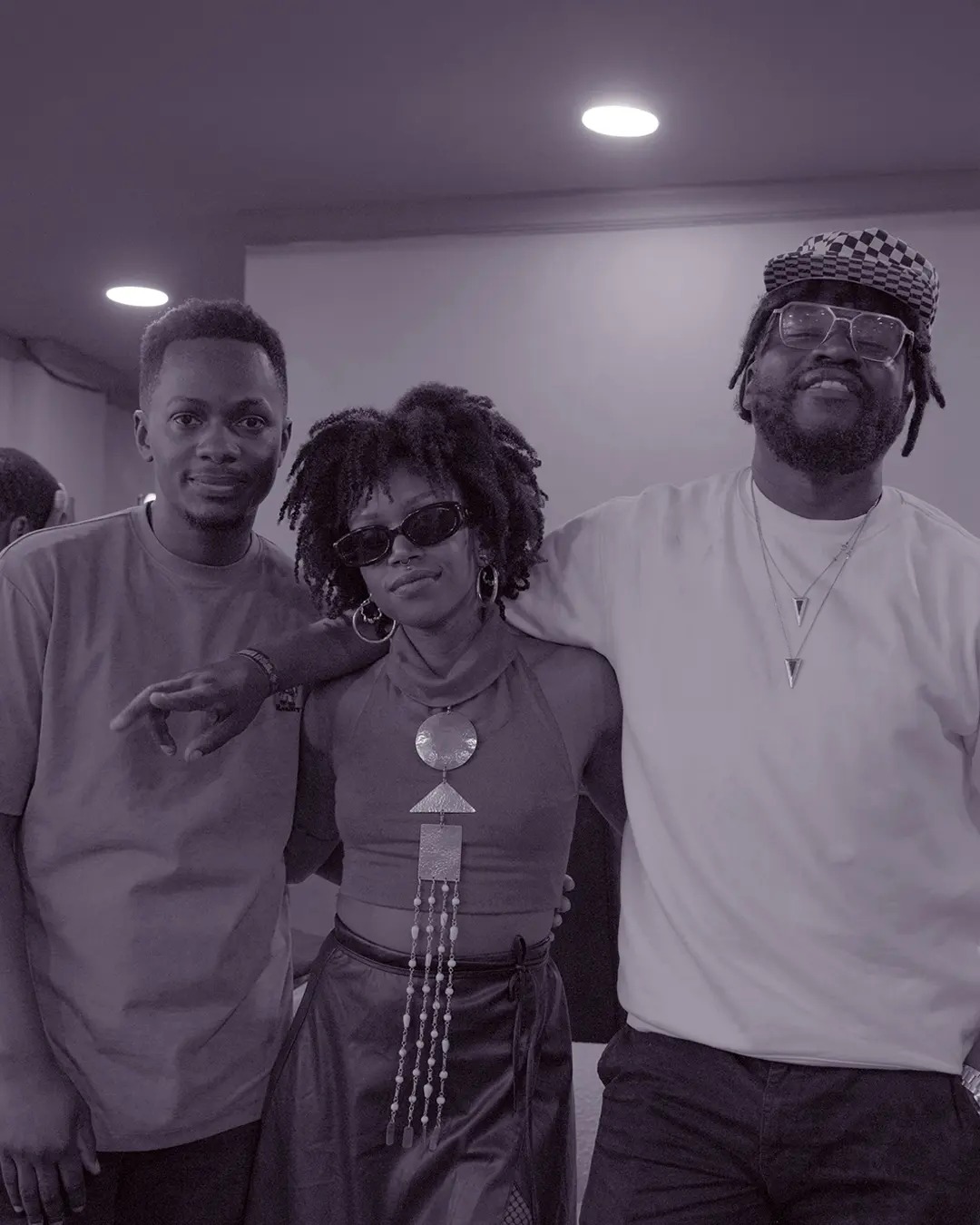In a world that praises self promotion and grandiose shows of opulence and charisma, Flier heads in the opposite direction. His poise and measuredness in speaking is a testament to the gentleman whom many have come to love. “I’m really appreciative,” he says concerning his growing popularity. If his show at Nakili Sessions is anything to go by, there is a hunger for his music and maybe even more for his presence. But what makes the man behind the music tick? For Flier, it has never been about fame. He describes it as a way to stay authentic to himself. “The barrier of entry for music is very low these days and so I have to ask myself, what can I do so as not to fit someone else’s vision.”
 From his many offerings, Flier seems to have created a lane for himself. One that somehow defies rather than conforms to what we have grown accustomed to in the music we consume. Part of this lane is a persona shrouded in mystery where we are only privy to the music he lets us hear whenever he wants us to hear it. “It’s a feeling. I always drop when I feel like the song resonates the most,” he concludes on his song release pattern that is nothing short of consistent but also a bit sporadic.
From his many offerings, Flier seems to have created a lane for himself. One that somehow defies rather than conforms to what we have grown accustomed to in the music we consume. Part of this lane is a persona shrouded in mystery where we are only privy to the music he lets us hear whenever he wants us to hear it. “It’s a feeling. I always drop when I feel like the song resonates the most,” he concludes on his song release pattern that is nothing short of consistent but also a bit sporadic.
A conversation between two friends
Listening to Flier’s music feels like eavesdropping on a conversation between two friends. The social isms espoused in his music speak to a rather regular Kenyan experience. An experience for which we only see one side of as is displayed by popular music and media; a life of partying and delinquency. His music is of regular occurrences in everyday life. “Nilikuambia nakupenda sana, ukanisoa grammar” is a line from “Wazungu wako Ulaya”, a song about a disgruntled lover who expects much more than the protagonist is willing to offer. This down to earth portrayal of love especially in the face of what we have come to expect from popular music is not only refreshing but also a unique perspective on what Kenyan music could be. For Flier, music reflects his own experiences along with those of his friends and companions, “My lyrics come from observations and conversations I have had with my friends,” he says as the conversation switches to the subject matter of his music.
Songs like “Uchumi ni Mbaya” have captured Kenyans’ imagination as it is not only a reflection of current circumstances but also a portrayal of lovers doing their best to get by these tough economic times. The opening line, “jana hokusai riba leo unaimba vile nakumada, leo unaimba vile nakumada,” is an experience that many young men especially are familiar with. Such is the nature of Flier’s music, able to capture Kenyan romance in a way only he knows.
Taking Control
Flier is a self produced musician. As he puts it, music was always around him growing up and him picking it up is just another tool to express himself even when he chooses to do it almost entirely by himself. This is also part of a Kenyan ism in how hardworking we are as a people. Self production for Flier is simply a means to an end in order to ensure that his vision for his music and life is not miscarried or misrepresented, “Do you remember those days we would go to studios looking for producers? I feel like a lot of the time my vision for the music was not aligned with the producers I would meet and therefore I decided to take control,” he says. And part of this taking control involved him teaching himself how to play guitar. “I know how to play guitar but in a very weird way as I taught myself.”
On whether he has any collaborators, Flier says that his inner circle of collaborators is very tight, maintaining a close lid on who he lets around his music lest it gets contaminated. In an attempt to find out more about his methods, it is revealed that his primary tool of choice for making music at least in this current iteration of his career is Ableton. “I started out with FL Studio before I moved to Logic and finally Ableton which supports my workflow,” he says as he provides insight on the difference between these different softwares, details of which are not relevant to this piece but demonstrate a thorough grasp on the technical side of his music.
Kanga Designs
A graphic designer by day, Flier is also responsible for his own artwork, a fact which he stresses takes more time than the music itself. “I spend a lot of time trying to figure out what the artwork is going to be so as to represent the song,” he says. This is where one of his most signature branding items comes; the kanga. “I came up with the kanga to represent a particular sound because at the end of the day, I will still do me and I want to still keep a core audience that knows a particular sound from me.” And from the Kanga design comes his most acclaimed songs like “Uchumi ni Mbaya”, “Wanawake wanataka Maendeleo”, “Vijana Wanataka Kazi” and “Wazungu Wako Ulaya.” If online rhetoric is anything to go by, the kanga seems to be the most significant design choice the Nairobi based musician has made.
Fans online have asked him to make the kangas into merchandise they can purchase. Another common theme in the kanga series for Flier is embedded socio-political messaging wrapped around love songs. What makes this messaging different from other songs that are more straightforward in their criticism of the political class is that the songs are aimed to entertain and use humour to pass the message while still providing a deep study on close interpersonal relationships that we experience as Kenyans. Flier sees the series growing to something bigger, maybe even an album, he teases.
For Lovers In Endless Revolutions
Even as the year continues to become more glorious for Flier which is an acronym for For Lovers In Endless Revolutions, he looks forward to his first big show at Blankets and Wine. “Again I am just appreciative of the opportunity as Blankets is a great platform for musicians,” he says, “you never know whether there will be new music by the time we have the show,” he concludes. The studio by his own admission, is his safe place without the hassle and bustle of the stage. It seems that Flier is keen on capitalising on the good year he’s been having starting with his show at the weekly Nakili Sessions earlier in July. If the turnout and reception online is anything to go by, Flier’s music resonates with audiences across the city with the show having a high turnout maybe more than even he expected. While thanking his fans on Instagram Flier wrote, “My apologies y’all, I wasn’t familiar with your game. My people showed up… and not only that, you sang and danced along to almost every song! You made a Wednesday feel like a payday weekend.”
Publicity
Despite being in conflict with his personality, Flier does not seem to be worried about anybody recognising him in the street anytime soon. “People don’t recognise me as I try not to put myself out there. Not many people know what I do. Even my friends and family are now starting to know what it is I do and they don’t treat me any different,” he says. But he seems to be embracing this new found lane and as he puts it, he is ready to step into a new dimension with his music.

On what’s next, Flier is currently locked in on his September show, “I am trying to put on a show for people that come to see me and especially people who don’t know me,” he concludes on his current preparations for Blankets and Wine. The future is bright for Flier as more shows line up and more people become aware of his music. As for what to expect from the budding musician, only time will tell.
Victor Muia
Victor Muia is an audio engineer, music producer, music writer and content creator. Going online as @megamuia, Victor seeks to draw a link between the past and present cultures of music especially through sampling.




